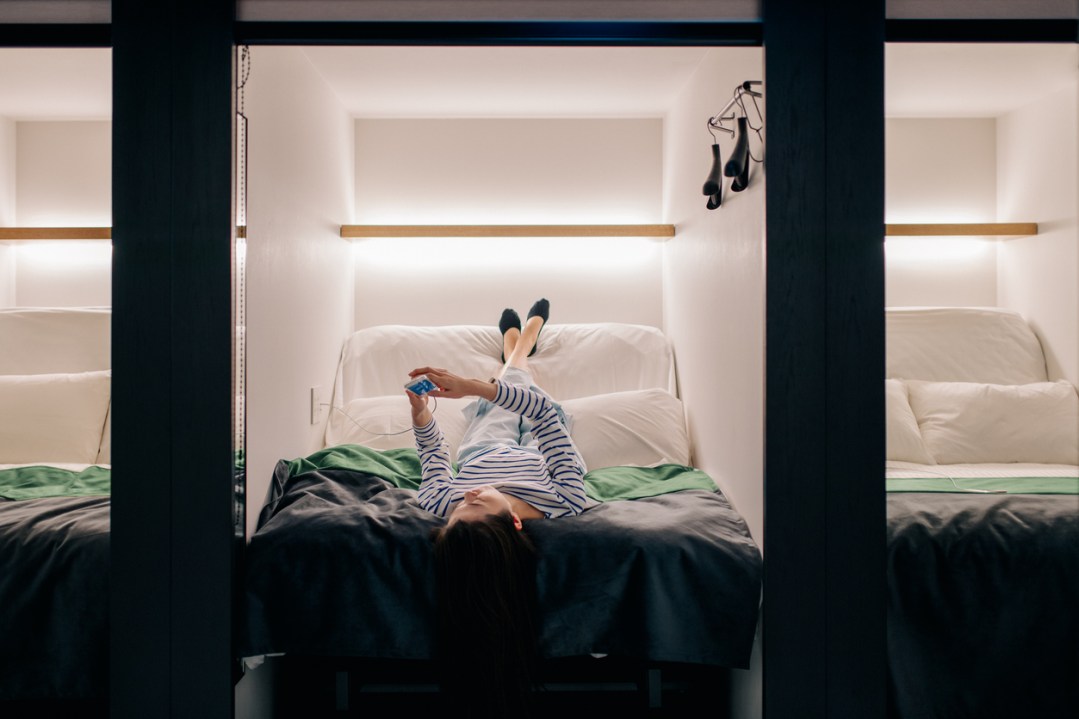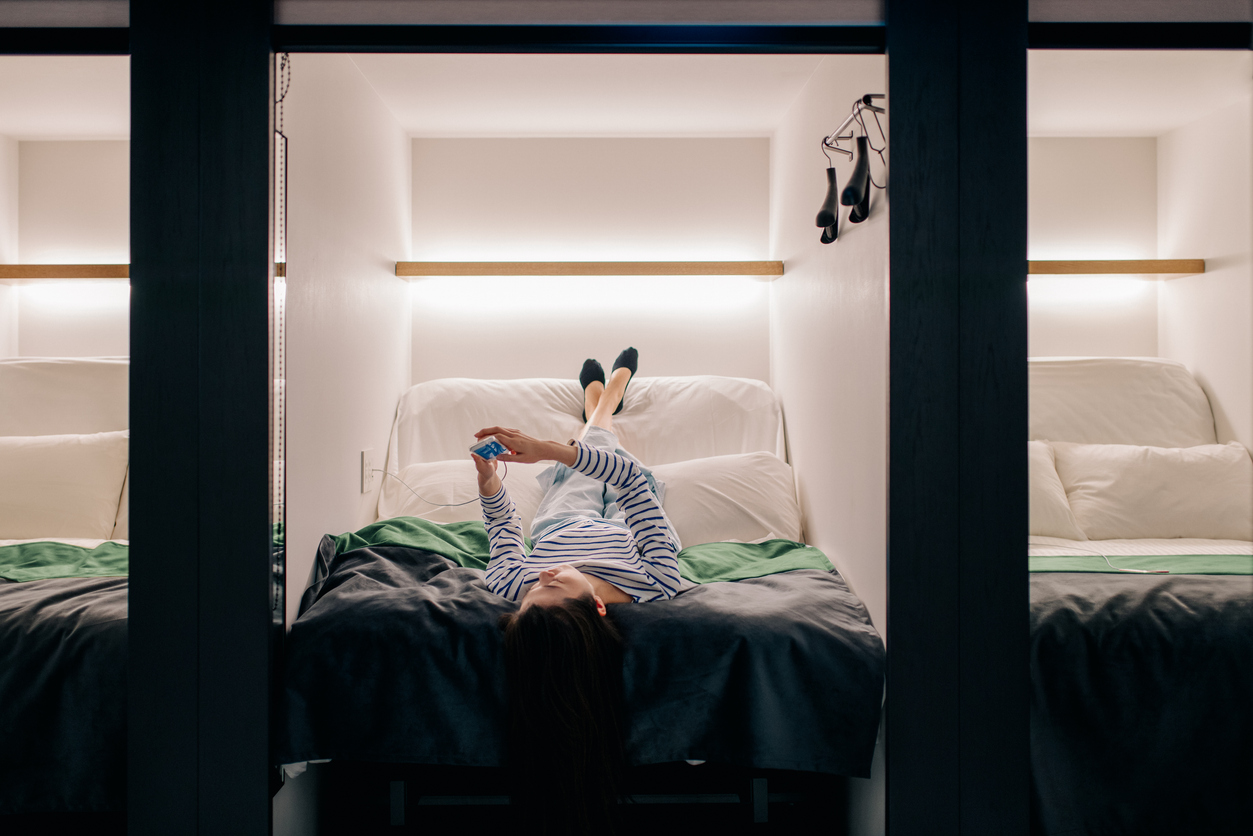Right beside the airport I often use to fly home from Italy, there is a pod hotel where I am becoming a regular client. These, as most will know, are dirt-cheap places where sleep is stripped down to its absolute core. For about £35 a night here, you get a tiny berth of a room – a ‘capsule’ about 4ft wide and 6.5ft long – with a narrow bed, a socket to recharge your devices and, if you want to work, a fold-down mini-table for your laptop. It is a bit like you imagine a rather poky Swedish prison cell, decorated with Nordic minimalism: white bed, white walls, fluorescent light, no windows. ‘We make every traveller’s dream come true,’ the leaflet says. ‘Finding a microcosm where, even for just an hour, you can sleep peacefully, concentrate on your PC or simply take a shower and change your clothes.’ For those who always fancied walking to their early morning plane but cannot stretch to the airport Hiltons and Holiday Inns, such places come like a gift.
Capsule or pod hotels have been around for nearly half a century. The first, I find out, opened in Osaka, Japan, in 1979. The units, about 3ft high, were stacked on top of each other with stepladders and you simply crawled into your hole and forgot the world. Each gave you a bed mat, air-conditioning, and a small chunky television set suspended from the roof (my pod has a tiny wall-mounted flatscreen, but as there is a 24-hour silence rule in place, it is more decorative than practical).
Capsule hotels were popular with men who had missed the last train or were too drunk to face their angry wives. In Japan, you are often expected, on entry, to swap your clothes and shoes for a bathrobe and slippers, making it oddly like visiting a spa (appropriately, some have saunas and communal baths attached). I had imagined the Asian capsules were as soundproofed as an isolation tank, but this is not the case. When one opened in China in 2012, older guests – or fatties – were asked on arrival if they snored, and if so, were relegated to a special noisy section where they could wheeze and groan to their hearts’ content. Far from dulling sound, the wood or fibreglass pods amplify it, turning a rustle into a roar and a sneezing fit into Götterdämmerung. Yet in their home continent, pod hotels have risen to heights of splendour. One rather swanky one – Sleeep in Hong Kong – looks like its been designed by Muji, with pinewood cladding, adjustable airflow and various ‘relaxation soundtracks’, offering ‘15 hours of quality sleep’ for HK$1,000 (about £97).
My Italian pod hotel is more basic. In a dimly lit industrial space just below ground, the terraced capsules look like human filing cabinets, with enormous ventilation pipes – great elephant trunks wrapped in metal foil – snaking into them from the roof. It reminds you of those storage spaces you have occasionally used between house moves in the UK. The walls are thin and the experience tends to be intimate – every scratch, intake of breath and nocturnal emission comes unfiltered from the cubicle next door (and God knows what they learn about you). Near your capsule, there is a passage of tiny, grey-painted shower rooms which no one has finished decorating and probably never will. There is a lot of bare concrete and unpainted plywood about, bringing back memories of student accommodation in the 1990s, before campus halls of residence seemed to get taken over by Trust House Forte. For those who loved youth hostels but know they are now too old to do it, capsule hotels are the perfect compromise: the chance to let certain standards go and rough it a little.
For those who loved youth hostels but know they’re now too old to do it, capsule hotels are the perfect compromise
It is not without amenities. There are vending machines which offer the entire panoply of Lays, Kinder and robot-made coffees but inevitably, you end up using the airport next door as your canteen. This is much better news in Italy than it would be in the UK, as Italian airports are rather sensual, theatrical places and generally are not out to steal from you (an espresso costs about £1, and a filled morning croissant no more £2). Wandering over from my capsule, choosing a café called Nonna Vitti’s (Grandma Vicky’s), I see a range of delicious-looking items that would put Heathrow or Gatwick to shame: trays of trofie pasta with pesto and tomato (the white, green and red of the Italian flag), chunky meatballs in ragu, arancini stuffed with cheese or ground pork, roast chickens and grilled peppers, and all for about €15. After the space-age white walls of your capsule – to which your eyes, over hours, get completely accustomed – the airport seems like a riot of colour.
There is a perfume shop offering scented soaps and room sprays all from the Isle of Capri, confectioners selling the gamut of limoncello and gianduja chocolates, and the airport adverts are a feast. Cups of espresso (with their spume of crema) stand out against shots of the sun-drenched Amalfi coast, while some of the ads have an ooh-er-missus naughtiness that would get you cancelled elsewhere. One shows a gorgeous, winsome beauty biting recklessly into a burrata cheese, splattering her chin and cleavage with drops of creamy liquid. ‘Don’t try this at home,’ says the ad slogan, though you do not know whether it is addressed to hungry customers or British ad creatives who want to hang on to their jobs.
Then, as my fellow customers head for the departure gates, I go back to the Zanussi whiteness of my pod a short walk away, to wait in marvellous privacy till check-in. It is becoming a kind of ritual, this stop-off at the capsule hotel, something I now do several times a year. In Japan a while back, during the Great Recession, people were forced to live in such places, paying a monthly rent, and I often wonder if I could do the same. Were it not for my cats – and the fact there is not room to swing a kitten here – I can think of worse fates. All a writer really needs is a place to lay their head, an internet connection, plentiful cheap espresso and – as Virginia Woolf so nearly put it – a capsule of one’s own.








Comments